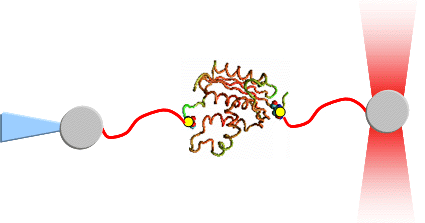

A number of methods which allow for the manipulation of single molecules have recently made available to experimentalists. They open exciting opportunities for the study of the structure and behavior of biological molecules and of their complex, but are also important because they allow to study the properties of small system driven away from thermal equilibrium by manipulation.
Indeed, quite a few remarkable relations concerning the distribution of energy and entropy flow in systems manipulated out of equilibrium have in fact been derived in the last years. They are collectively know as "Fluctuation theorems". They could be the first stepping stones towards the establishment of a statistical mechanical description of nonequilibrium system of generality close to the equilibrium statistical mechanics. It appears that these relation find their most natural application when they are applied to small systems, in which the typical mechanical or chemical energies exchanged are of the order of kT. They can also be harnessed to retrieve information about the equilibrium properties of these system by manipulating them, even if such a manipulation brings them out of equilibrium.
In my recent work, mostly performed in collaboration with Alberto Imparato (presently at the University of Aarhus (Danmark)), I have attempted to establish, with some degree of generality, the distribution of energy and entropy flow in small thermodynamical systems manipulated out of equilibrium. This has incidentally allowed to find new, simpler, derivations of the fluctuation theorems. One can also exploit these results to evaluate the uncertainty of reconstructed (free) energy landscape from manipulation experiments. The development of the theory is supported by the collaboration with the Laser Spectroscopy and Optical Manipulation group of our department, where experiment of manipulation via optical tweezers of small latex spheres are being performed.